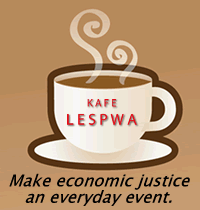There are no easy answers to panhandling. This is why the Catholic Worker movement has always stressed the importance of personal involvement with the poor. You just can't know what the "right thing" to do is unless you walk a few miles with the people you are helping, and even then the decisions are often difficult. Your spare change could buy someone a crack fix. Your spare change could also save someone's life with emergency food or medicine. There is no way to know for sure. There is no blanket solution that serves every person equally, as much as we might like one.
I tend not to support panhandling. I rarely carry cash, so that makes the decision easy. I would rather address poverty systematically rather than in some random way, but I don't pretend to know if that's the right decision or not.

An interpretation of "Lazarus and the Rich Man" from Luke's gospel.
However, I have to admit that in some ways I like panhandling, even though I would never wish that anyone had to do it. It does get people talking. It forces us to think about an issue that we'd all rather forget about. It is poverty getting right up in your face. If the panhandlers would keep to themselves and only ask for their needs at established agencies and shelters, most of the general public would never have to engage with them or ask themselves these tough questions.
The truth is that there are poor people out there every day, even if they do not make an effort to approach anyone. Yet, it seems much more real when it is up close and personal. We feel guilty if we turn away a panhandler--and it can really ruin a night out on the town. But the truth is that we turn away poor people every single day. The fact that there are some days when people do not ask us directly face-to-face does not change the fact that we know they are out there and that they need help.
Why should be wait until someone randomly finds us on the street and asks us for help? That's not a very strategic way of addressing poverty.
It is interesting that we feel a moral obligation to do something when asked directly, but often don't feel it otherwise. It seems to be part of the human condition. It is the same condition that allows us to be mortified at the picture of a single wounded person but take little interest in lists of bombing casualties of war victims we never see. We must always strive to stay personally involved because of this inherent tendency in the human condition--out of sight very often makes something out of mind, and, apparently, out of reach of our heart, too.
I've ever heard some people say they would like to see the soup kitchens and shelters closed down, bringing masses of people out into the streets begging from anyone they could find. This would force society as a whole to do some serious thinking about poverty. While I can understand the logic, I would never advocate for the poor to be used as pawns like that.
The Catholic Worker has always advocated for giving direct food, clothing and shelter to those who need it, even if that means we run the risk of being a "band aid" by cleaning up the mess that our unjust society has created. Out of mercy for the poor, we must help them--a hungry person needs food right away, and he can't wait for society to change to get it.
But we also work for long term, systemic change. We must ask the question, "Why are they poor in the first place?" Being approached by a panhandler on the street can be a big wake-up call, but we don't need to wait for panhandlers to approach us. For every panhandler there are dozens more who suffer in silence, never asking for help. Or maybe they just aren't able to find you. What are we doing about poverty every day?





2 comments:
Thank you for posting this. As you wrote in your post, this certainly is a difficult and often divisive topic. My wife and I have discussed this on several occasions. Jesus tells us to give without reservation (Luke 6:30) or expectation of return (Luke 6:34). This is the heart of charity. We are to see Jesus in the other and so my giving money is between Jesus and me. How wisely someone spends the money is then between Jesus and them. I think of the Graces that God has given me in my life that I have foolishly squandered. It is only through God's infinite love and patience that He continues giving to me.
I work downtown and there are always people panhandling. Some rattle a cup of change, some have a story of why they need fifty cents and still others are just huddled in a doorway. While it is true that one person cannot help everyone, we make decisions on who we will help. My concern is our basis for those decisions. The implications can be distressing. Does one seem more worthy of help than another?
I was getting off the bus after work one day and saw a van on the side of the road. The driver had the hood up and was milling around looking distraught. As I walked passed I asked the obvious question about being out of gas. I could tell that he had just finished work and was on his way home. He asked if I had any spare change so he could get enough gas to get home. I reached in my pocket and handed him much more money than he expected. He was very grateful. That was such an easy thing for me to do because I knew the variables of the situation. The money would be going to help him get home to his family. While my giving was out of love for another, it is what I call “easy charity.” Things get really tough when we have to trust how the other person will spend the money Somehow I think Jesus gives more credence to those times when we do not know and just give out of love.
Thanks,
Mike
Hi, I can’t understand how to add your site in my rss reader. Can you Help me, please :)
Post a Comment